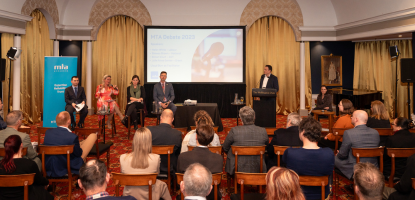24 August 2023
MPs Front for MTA Debate
The four main political parties gave insights into their transport policies and plans at a lively and at time contentious debate hosted by MTA on Wednesday night.
Helen White (Labour) Simeon Brown (National) Julie Anne Genter (Green) and Simon Court (ACT) were grilled on a range of automotive industry topics by moderator Lloyd Burr, and at times the audience.
60 people attended the debate at the Wellington Club, with many more MTA members watching a live stream online.
The debate focussed on issues identified in MTA’s election year call to action, Driving New Zealand Forward: People, Safety, The Future and Strong, Fair Markets.
After an introduction from MTA Chief Executive Lee Marshall, who reminded the audience that MTA always “puts the consumer, and the general good, front of mind”, participants were given a minute to make an “elevator pitch” of their plans if they form part of the next Government.
Addressing climate change and infrastructure were central themes for all the parties.
The politicians then addressed a range of topics.
Both Simeon Brown and Helen White acknowledged the success of the Apprenticeship Boost, but neither would be drawn on whether they would make it permanent beyond 2025.
On the subject of the Warrant of Fitness, all parties agreed changes were needed to the testing regime, but disagreed on what they were.
Simeon Brown said the 12-month Warrant of Fitness for vehicles registered since 2000 needed review, as did the $200 fine for driving without a current WoF; Helen White was interested in MTA’s proposal for greater testing of emissions as part of the warrant process; Julie Anne Genter agreed with MTA’s call around the warrant and emissions testing in the manifesto; and Simon Court said many people needed more money in their pocket so they could keep their vehicles at a safe standard.
Some of the more spirited exchanges involved quick-fire questions. In particular, the participants fired up over bilingual road signs. ACT said the signs would be more expensive, National that the focus should be on improving roads first, while Labour and Green strongly supported the signs.
Asked by an attendee what their “Plan B” was if it became impossible for EVs to be shipped to New Zealand because of safety concerns, participants agreed the industry and technology would find a solution.
There was no consensus on the issue of Right to Repair, but in a rare moment of unity, all parties were interested in MTA’s call for greater action on the issue of vehicles dumped at a repairer and going unpaid and unclaimed. They said they would be happy to look at it and work with industry to solve a problem that places a financial burden on the business.
Questions from attendees kept the MPs on their toes before they had to leave the debate to return to Parliament.
.png?sfvrsn=d38179f7_1)

 From left to right, Simeon Brown (National), Helen White (Labour), Julie Anne Genter (Green), Simon Court (ACT) and Lloyd Burr
From left to right, Simeon Brown (National), Helen White (Labour), Julie Anne Genter (Green), Simon Court (ACT) and Lloyd Burr Julie Anne Genter (Green)
Julie Anne Genter (Green) Simon Court (ACT)
Simon Court (ACT) Simeon Brown (National)
Simeon Brown (National) Helen White (Labour)
Helen White (Labour)